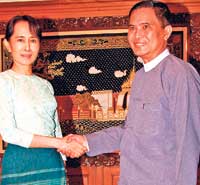
Yangon residents see flicker of hope in MyanmarYANGON, Saturday (AFP) - Residents in Myanmar's main city Yangon are divided over the prospects for change after a meeting between opposition leader Aung San Suu Kyi and an official of the junta which has ruled for the past 45 years. The Nobel peace laureate, on Thursday, gave a statement through UN envoy Ibrahim Gambari saying she was ready to start working with the junta and that she was committed to pursuing dialogue.
Yesterday, for the first time in more than three years, Aung San Suu Kyi was allowed to meet senior officials from her National League for Democracy party and Labour Minister Aung Kyi, whom the junta has appointed to liaise with her. Aung San Suu Kyi was optimistic after the meetings and believed it was time for the “healing process” to start, her party said. Many in Yangon, which was at the heart of recent anti-junta protests, also expressed optimism over the signs and were hopeful that the military rulers would heed her offer to hold talks. “It's a good tactic to pursue the military government,” said one 40-year-old man, who like most people in Myanmar wished to remain anonymous because of the sensitivity of the subject. “If the government doesn't accept her offer.. it would be their responsibility.”Retired civil servant Thin Thin also said she was pleased by the development, which she said offered a realistic chance for change. “I think many will welcome her message because we can't just throw out the military from the country. She knows that if that happened, it would hurt the people,” the 51-year-old said. Protests began in August in response to a surprise rise in fuel prices, and swelled after Buddhist monks took to the streets. Up to 100,000 people rallied against the junta in Yangon, but the regime violently crushed the protests, leaving 10 dead by official count, although diplomats said the real toll was far higher. Although Friday's meetings and Gambari's visit have raised some hope that the monks' movement may have achieved something, others questioned how far the junta would be willing to go. One monk who joined the protest said he believed the generals were only trying to appease the international community, and did not really have the political will for dialogue.“Basically if they were honest enough, the process should not be very long like this,” said the monk, who said he was concerned the junta would drag the process out. People were also worried that the junta was sticking doggedly to its own so-called “road map” to democracy, a tortuously slow-moving process that has so far excluded Aung San Suu Kyi and her party.“As long as the junta doesn't change their policy, there will be no more progress, no matter whether Aung San Suu Kyi cooperates with the government,”said a businessman in his 50s. “As you see, the junta is still holding on to its seven-step road map. Now the process has taken more than a decade. The minute they change their policy, everything will be fine. It all depends on their policy,” he said. Security was beefed up in Yangon on Thursday as Gambari criss-crossed the city to meet with UN staff and Aung San Suu Kyi, but on Friday the situation was back to normal, with few police or army visible in the streets. |
|| Front
Page | News | Editorial | Columns | Sports | Plus | Financial
Times | International | Mirror | TV
Times | Funday
Times || |
| |
Reproduction of articles permitted when used without any alterations to contents and the source. |
© Copyright
2007 | Wijeya
Newspapers Ltd.Colombo. Sri Lanka. All Rights Reserved. |
